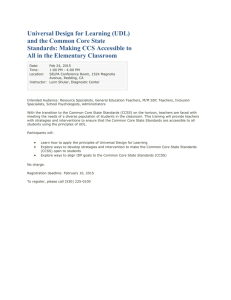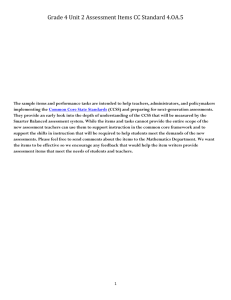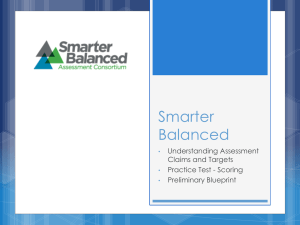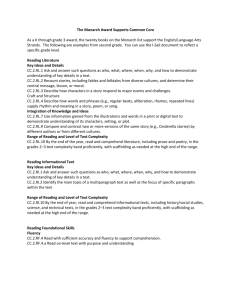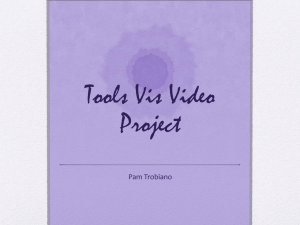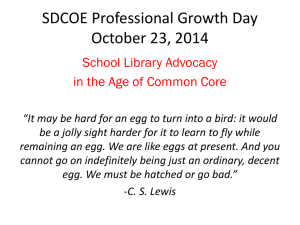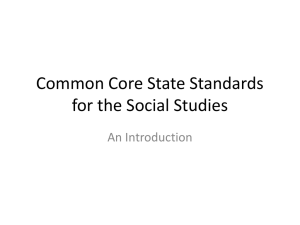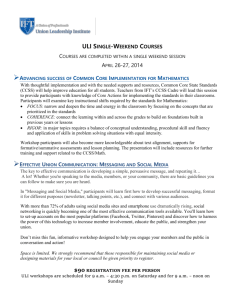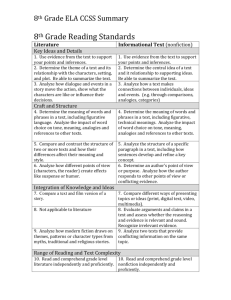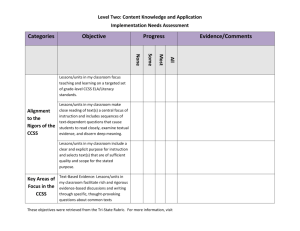3rd grade Unit 1
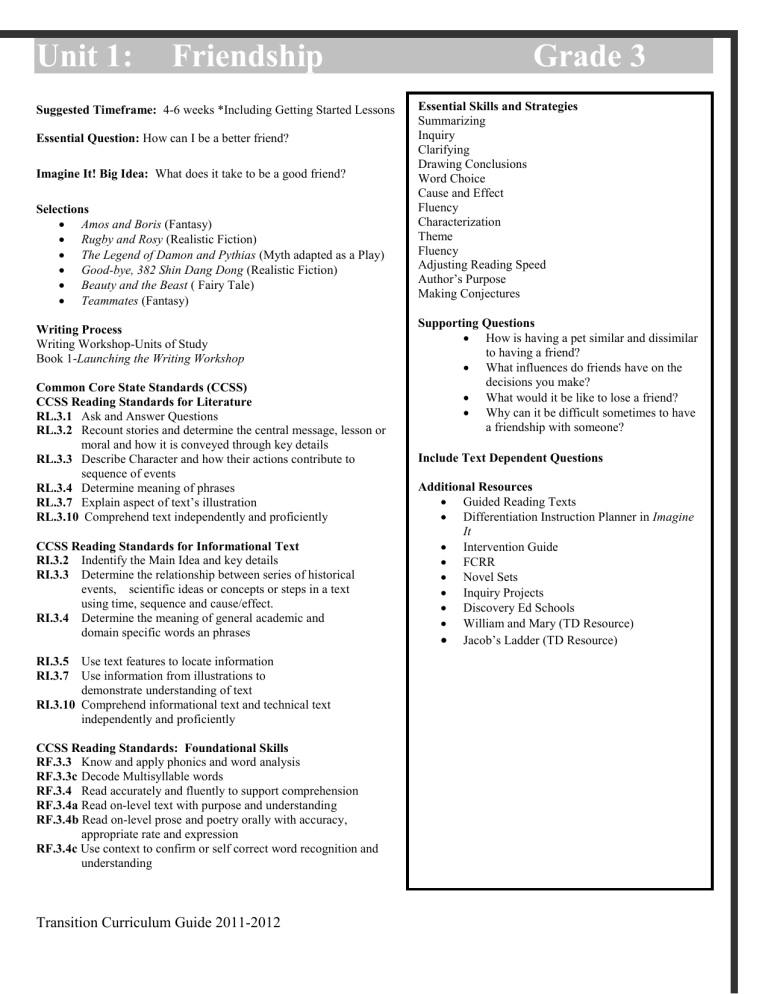
Unit 1: Friendship Grade 3
Suggested Timeframe: 4-6 weeks *Including Getting Started Lessons
Essential Question: How can I be a better friend?
Imagine It! Big Idea: What does it take to be a good friend?
Selections
Amos and Boris (Fantasy)
Rugby and Rosy (Realistic Fiction)
The Legend of Damon and Pythias (Myth adapted as a Play)
Good-bye, 382 Shin Dang Dong (Realistic Fiction)
Beauty and the Beast ( Fairy Tale)
Teammates (Fantasy)
Writing Process
Writing Workshop-Units of Study
Book 1Launching the Writing Workshop
Common Core State Standards (CCSS)
CCSS Reading Standards for Literature
RL.3.1
Ask and Answer Questions
RL.3.2
Recount stories and determine the central message, lesson or moral and how it is conveyed through key details
RL.3.3
Describe Character and how their actions contribute to sequence of events
RL.3.4
Determine meaning of phrases
RL.3.7
Explain aspect of text’s illustration
RL.3.10 Comprehend text independently and proficiently
CCSS Reading Standards for Informational Text
RI.3.2
Indentify the Main Idea and key details
RI.3.3 Determine the relationship between series of historical events, scientific ideas or concepts or steps in a text using time, sequence and cause/effect.
RI.3.4 Determine the meaning of general academic and domain specific words an phrases
RI.3.5
Use text features to locate information
RI.3.7
Use information from illustrations to demonstrate understanding of text
RI.3.10
Comprehend informational text and technical text independently and proficiently
CCSS Reading Standards: Foundational Skills
RF.3.3 Know and apply phonics and word analysis
RF.3.3c
Decode Multisyllable words
RF.3.4 Read accurately and fluently to support comprehension
RF.3.4a
Read on-level text with purpose and understanding
RF.3.4b Read on-level prose and poetry orally with accuracy, appropriate rate and expression
RF.3.4c Use context to confirm or self correct word recognition and understanding
Essential Skills and Strategies
Summarizing
Inquiry
Clarifying
Drawing Conclusions
Word Choice
Cause and Effect
Fluency
Characterization
Theme
Fluency
Adjusting Reading Speed
Author’s Purpose
Making Conjectures
Supporting Questions
How is having a pet similar and dissimilar to having a friend?
What influences do friends have on the decisions you make?
What would it be like to lose a friend?
Why can it be difficult sometimes to have a friendship with someone?
Include Text Dependent Questions
Additional Resources
Guided Reading Texts
Differentiation Instruction Planner in Imagine
It
Intervention Guide
FCRR
Novel Sets
Inquiry Projects
Discovery Ed Schools
William and Mary (TD Resource)
Jacob’s Ladder (TD Resource)
Transition Curriculum Guide 2011-2012
CCSS Writing
W.3.2 Write informative/explanatory text
W.3.2a
Introduce a topic, group related information and include illustration to aid in comprehension
W.3.2b
Develop the topic with facts, definitions, and details
W.3.2d
Provide a concluding statement or section
W.3.3
Write narratives using effective technique, descriptive details and clear event sequences
W.3.3a
Establish a situation and introduce a narrator and/or characters; organize an event sequence that unfolds naturally
W.3.3b Use dialogue and descriptions of actions, thoughts, and feelings to develop experiences and events or show the response of characters to situations
W.3.3c Use temporal words and phrases to signal event order
W.3.3d Provide a sense of closure.
W.3.4 With guidance and support from adults, produce writing in which the development and organization are appropriate to task and purpose. (Grade-specific expectations for writing types are defined in standards 1–3 above.)
W.3.5 With guidance and support from peers and adults, develop and strengthen writing as needed by planning, revising, and editing. (Editing for conventions should demonstrate command of Language standards 1–3 up to and including grade 3 on pages 28 and 29.)
W.3.6 With guidance and support from adults, use technology to produce and publish writing (using keyboarding skills) as well as to interact and collaborate with others.
W.3.7 Conduct short research projects that build knowledge about a topic.
W.3.10 Write routinely over extended time frames (time for research, reflection, and revision) and shorter time frames (a single sitting or a day or two) for a range of discipline-specific tasks, purposes, and audiences.
CCSS Speaking and Listening Standards
SL.3.1
Engage effectively in a range of collaborative discussions (one-on-one, in groups, and teacherled) with diverse partners on grade 3 topics and texts
, building on others’ ideas and expressing their own clearly.
SL.3.1a
come to discussions prepared having read or studied required material; explicitly draw on that preparation and other information known about the topic to explore ideas under discussion.
SL.3.1b
Follow agreed-upon rules for discussions (e.g., gaining the floor in respectful ways, listening to others with care, speaking one at a time about the topics and texts under discussion).
SL.3.1c
Ask questions to check understanding of information presented, stay on topic, and link their comments to the remarks of others.
SL.3.1d
Explain their ideas and understanding in light of the discussion.
SL.3.2
Determine the main ideas and supporting details of a text read aloud or information presented in diverse media and formats, including visually, quantitatively, and orally.
SL.3.3
Ask and answer questions about information from a speaker, offering appropriate elaboration and detail.
Common Task
Create an opinion piece that includes an introduction, a clearly stated opinion, reasons to support the opinion, linking words, and a concluding statement or section. (W1)
Possible Tasks / Products
(Please note that additional standards will be addressed when completing these tasks (Speaking and Listening, Language, and
Reading)
Create a graphic organizer (double map) to compare and contrast two friends. (W8)
Research to find famous friendships in history and create a display/paper to share the information. (W7)
Do’s and Don’ts of Friendship- Create a chart that is posted with the do’s and don’ts of friendship that can be used throughout the unit. (W8)
Create a friendship poem using technology. (W8)
